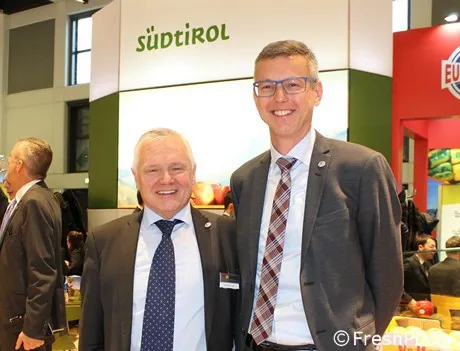The outgoing director of the Vinschgau Association of Fruit and Vegetable Cooperatives (VI.P) Josef Wielander will retire at the end of March 2019, with a hint of sadness but also proud of his work. We interviewed him at the Fruit Logistica in Berlin, where he told us about his 43-year career.
"My years as director have been marked by great changes. I started in 1976 as director of the fruit cooperative Mivo; until the mid-1980s I witnessed the birth of the large distribution chains (Coop, Esselunga, Edeka, Sainsbury's to name a few) that were then supplied by wholesalers who imported apples. Those who were the first to get a share in the supermarkets won. But soon wholesalers lost their jobs," Wielander (pictured below) told FreshPlaza.
"Another very important factor was the funds provided by the Common European Market in the '80s. Operational programmes were born in 1997 and since then we have used a percentage of the previous year's figure to improve our presence on the markets. We have invested in cutting-edge production and processing. These investments have promoted courageous and highly innovative choices for the sector. It was necessary to keep up with innovation and to encourage organic production".
The greatest satisfaction for the outgoing director came in 2007 with the commissioning of centralized sales. "Before, all cooperatives were free and the customer chose where to buy. Each cooperative sold almost in competition with its neighbour. It was necessary to overcome this parochialism, so we thought about making the Vinschgau a single entity through the VI.P consortium at both commercial and productive levels. A success not to be overlooked, because it has brought us well-being".
We can say that the model of apple tree cooperation is taken as an example by almost all the associations of producers in Italy, because it works and is good. And Wielander is really proud of this.
Over the years, the type of consumption has also changed. "Today we are looking for a taste experience by eating an apple, we are no longer looking for tradition. Even the biological factor has acquired greater importance: in the 1970s and 1980s no one talked about organic, today it is normal. In current offers, there must be both the organic product and the conventional one".
A metamorphosis has also occurred at the varietal level. "This implied the need to find alliances with other realities, such as VOG and Rivoira, and to ask the experimental stations for the cultivars available in the world and to buy the rights, so that the members could produce them. It was not easy and, still now, the road is uphill, even though it is the right one. Indeed, every year new varieties are released.
There have also been developments in the markets. "With the Russian embargo and the North African policy in turmoil (Libya, Algeria, Egypt), it was necessary to find new commercial outlets. At the moment, we serve 42 nations in the world. Italy accounts for 50% of our sales, and this is a good thing. Every time a market is missing, you have to find another one but, since they are small percentages, you can still control the situation." According to Wielander, if the protocols are successful in Asia, there could be more opportunities.
"Supply and demand are not balanced. Today it is more difficult to place all the apples with certain remunerations and a certain peace of mind. In my opinion, in the near future, in the apple market only the most successful will remain, that is, those who have the right relationship between organic and integrated production, between innovative and traditional varieties, and between developing countries and adequate quality to offer.
 Josef Wielander (outgoing director) and Martin Pinzger (appointed director).
Josef Wielander (outgoing director) and Martin Pinzger (appointed director).
"I leave my role as director with a bit of sadness and a bit of pride for what I have achieved. I thank all those who have accompanied me. Over the years I have always had the feeling of having my back covered by the entire structure, I have been offered the tools to operate and not only from a human point of view. I hope that what I have done well will be maintained and that the necessary changes will be made, where mistakes have been made".
"I am glad that my successor, Martin Pinzger, is a person worthy of the role, competent and with his feet on the ground. He has the skills, experience and above all the desire to do his best to ensure the existence of our members and also the revenue necessary to survive," Wielander concludes.
